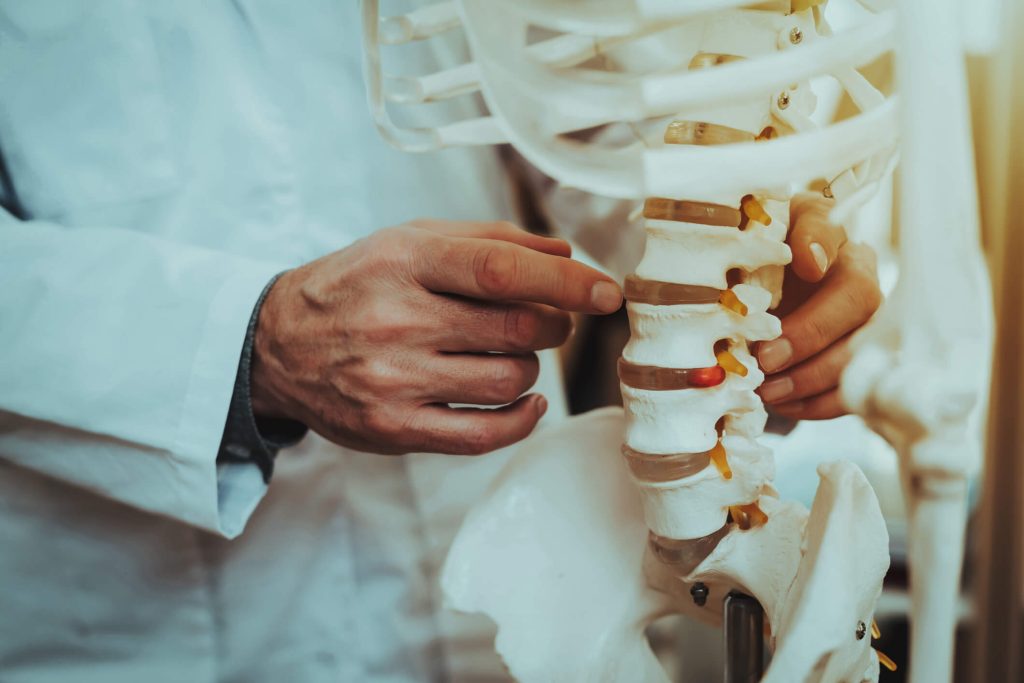
Magnesium’s Role in Bone Health


Magnesium’s Role in Bone Health
While often shadowed by its more famous counterparts, calcium and vitamin D, magnesium is an important mineral when it comes to bone health. In fact, over sixty percent of your body’s magnesium is stored within your bones, a testament to its significant role in skeletal health . Below, we break down why it is so crucial, and how to take it properly to ensure you get all its benefits.

How Does Magnesium Support Bone Health?
Our bodies contain about 20-28g of magnesium at any given time . That is a lot! As we learned above, we store most of this reserve within our bones. The magnesium on the bone surface can move easily between bones and blood, ensuring that our blood magnesium levels remain stable . When blood magnesium levels drop, magnesium can quickly be released from bones. Conversely, when blood levels rise, magnesium can bind to the bone surface.
But, despite just being a quick source of magnesium for the blood, there are other reasons why we keep so much magnesium within the bones. Curious about exactly how magnesium benefits bone health? Let’s dive into the mechanisms!
Supports Homeostasis of Calcium Levels
There are several key players when it comes to maintaining calcium balance in the body. Mainly, these include vitamin D and parathyroid hormone (PTH) . The parathyroid hormone regulates calcium in the blood. When blood calcium is too low, parathyroid takes calcium from the bones, increases gut calcium absorption, and reduces kidney calcium excretion.
Magnesium influences both vitamin D and parathyroid hormones, supporting your body’s calcium levels. A lack of magnesium is linked to lower levels of both PTH and vitamin D, which are key players when it comes to calcium homeostasis . Let’s break some of them down:

To absorb calcium from your diet, you first need vitamin D in its active form (calcitriol or 1,25-dihydroxycholecalciferol). When active, vitamin D works in the digestive tract to absorb calcium from the foods that you eat. Magnesium is required for an enzyme that converts vitamin D into its active form . But when magnesium levels are low, this enzyme doesn’t work well and leads to less of the active vitamin D. This reduces calcium absorption and thus overall available calcium in your body. But, when magnesium levels are where they should be, you maximize calcium absorption.
Magnesium also helps manage the secretion of parathyroid hormone by blocking certain calcium channels in your parathyroid cells . When magnesium levels are high, these channels are blocked and reduce the amount of calcium entering cells. This reduction in calcium within cells reduces PTH secretion. Aside from blocking calcium channels, magnesium also makes the parathyroid gland more responsive to calcium levels in the blood, ensuring it is released appropriately to maintain calcium balance.
In conclusion, low magnesium can disrupt PTH secretion and function, causing calcium imbalances. The good news is that sufficient magnesium intake can help restore PTH levels and improve calcium balance.
Supports Bone Growth and Repair
Magnesium is a component of the bone mineral matrix – it contributes to the physical structure of your bones [R4]. However, outside of this, it can also influence the activity of two key cell types needed for bone growth and repair – osteoblasts and osteoclasts . You need both for strong, healthy bones.
Osteoblasts help build new bone, while osteoclasts help with bone resorption . Bone resorption involves breaking down old or damaged tissue, to make space for new bone. Our body requires a proper balance between these two processes for healthy bone remodeling, helping to ensure that our bones remain strong and resilient. Certain factors like nutrient deficiencies, high cortisol, low sex hormones, and stress can tip the balance more toward bone breakdown.
Magnesium promotes the growth of osteoblasts, your bone builders . This helps your body create new bones. It does this by activating certain processes necessary for osteoblast function and bone formation . Without enough magnesium, this process can be hindered and result in less bone formation.
Magnesium is needed for osteoclasts, which break down old bones, for their development and function . It helps regulate important signals between cells that are crucial for osteoclast formation .
Low magnesium can cause an imbalance between bone breakdown and formation, leading to weaker bones. It can also impact bone structure and integrity by changing the size and structure of bone crystals. Bone crystals, also known as hydroxyapatite crystals, are the main mineral component of bone .

Supports Healthy Stress Response and Hormone Levels
Prolonged elevated cortisol, such as from chronic stress, can increase osteoclast relative to osteoblast.
Magnesium has a key role in supporting a healthy stress response through balancing hormones, particularly estrogen and cortisol .
Cortisol, often called the “stress hormone” is released by your adrenal glands in response to stress. While our bodies need it to a certain degree, chronically high cortisol can promote bone resorption and inhibit bone formation . This delicate balance, as we just learned above, can reduce bone mineral density.
To make matters worse, high levels of cortisol over time can actually cause your kidneys to excrete more magnesium . That is why, if you are always feeling stressed, getting enough magnesium can be even more important.
Magnesium can also influence the hormone estrogen. Estrogen is crucial for maintaining bone density, especially in women. It protects your bones by promoting bone formation and inhibiting its breakdown. During menopause, we tend to see significant drops in estrogen levels, and this can have negative impacts on bone health. We also tend to see lower levels of magnesium when estrogen levels are low .
By modulating these two hormones, magnesium protects your bones from stress. It also helps maintain a hormonal environment conducive to strong and healthy bones.
Modulates Inflammatory Response and Oxidative Stress

Oxidative stress is characterized by an imbalance between the production of harmful reactive oxygen species, or ROS, and the body’s ability to clear them . Over time, this can cause damage to cells.
Oxidative stress can increase proteins called cytokines . Certain cytokines can stimulate osteoclasts, increasing the rate of bone breakdown . At the same time, oxidative stress can affect bone cells and the extracellular matrix, the gel-like structure around your bone cells that supports your bones . Combined, oxidative stress and cytokines can have detrimental impacts on bone health.
Magnesium helps manage oxidative stress. It serves as a cofactor (helper) for several key antioxidant enzymes – superoxide dismutase, glutathione peroxidase, and catalase . These enzymes are vital for clearing ROS and mitigating cell damage . A magnesium deficiency can increase oxidative stress because it impairs these key enzymes . Magnesium also inhibits the bone-unfriendly cytokines .
Therefore, magnesium deficiency is linked to:
- Higher bone-unfriendly cytokines
- More oxidative stress .
- More oxidative damage on bone cells and matrix between bone cells
As a result, this tips the balance towards less bone building and more bone resorption.
Ensuring you get enough magnesium can help maintain a balanced inflammatory response, helping promote bone health long-term.
May Promote Healthy Blood Flow to the Bones

For your bones to grow and remain strong, they need nutrients and oxygen. So, poor circulation that tends to come with aging and a suboptimal lifestyle can affect bone health.
Magnesium can help support healthy circulation and blood vessel health . You need magnesium for healthy nitric oxide production in the blood vessels. Nitric oxide helps relax the blood vessels, ensuring blood flows properly. Therefore, a magnesium deficiency can affect blood supply to your bones.
Low magnesium levels can affect cardiovascular health, and some studies suggest that this might have consequences for bone health .
While we need more research in this area, ensuring you get enough magnesium can be a good preventative approach.
Which Magnesium Is Good For Your Bones?
Not all forms of magnesium are created equal. The bioavailability, or how much magnesium is absorbed through supplementation, can vary depending on which type of magnesium is in the supplement.
We have an entire article devoted to the different magnesium types and their benefits, which you can read here.
When it comes to bone health, studies oftentimes fail to report the specific types used. However, in one review, intervention studies on magnesium supplements reported using forms like citrate, carbonate, or oxide in doses ranging from 250 to 1800 mg for benefits .
Choosing the right type of magnesium can significantly impact its efficacy in supporting bone health. Citrate, bis-glycinate, malate, and chloride are all forms that demonstrate high bioavailability and thus are excellent options.

How Much Magnesium Should You Take?
The doses of magnesium typically used in clinical trials for bone health vary between 250-1800 mg per day [R19]. However, too much magnesium can also cause side effects, including irregular heart rate, low blood pressure, and confusion .
Too much magnesium might also have the opposite effect on bone, because of its interaction with calcium (more on this below) and disrupt bone remodeling.
Generally, 350 – 420 mg per day from supplemental magnesium is very safe . But, because most of us are deficient, and factors like low estrogen increase magnesium excretion, you might need more than the RDA dose [R]. We covered this in a recent article, which you can access here.
Should You Take Calcium and Magnesium Together?
Another supplement commonly used to support bone health is calcium. No surprise here, most know that it is crucial for the development and maintenance of strong bones. So, would it not make sense to take both at the same time?
While generally, it is safe to take them together, it might be more beneficial to spread doses a couple of hours apart. This is because magnesium can actually reduce calcium absorption, or vice versa . Both magnesium and calcium compete for absorption in the intestines, and both minerals use similar pathways for absorption. So, a high intake of one can inhibit the absorption of the other.
However, we need both of these important minerals for not only bone but overall health. The balance between calcium and magnesium is crucial for maintaining bone health, muscle function, and proper heart function. This is where the calcium/magnesium ratio comes into play. An ideal ratio between the two is 2:1 – two parts calcium and 1 part magnesium .

When it comes to bone health, this 2:1 ratio serves some important functions. Calcium is crucial for building and maintaining strong bones and teeth. Magnesium, as we learned above, is essential to convert vitamin D into its active form and support calcium absorption. When these minerals exist in this balanced ratio, it ensures that calcium is effectively incorporated into the bone matrix.
Final Notes
When it comes to protecting your bones long-term, incorporating magnesium into your supplement routine can be a great tool.Here at BIOptimizers, we have combined multiple types of magnesium in order to maximize absorption and give you the best product. Magnesium Breakthrough, combining seven of the most studied forms along with vitamin B6, was developed to help support getting your whole-body magnesium levels into the optimal range.
References
- Magnesium. Nih.gov. Accessed July 5, 2024. https://ods.od.nih.gov/factsheets/Magnesium-HealthProfessional/
- Vormann J. Magnesium: nutrition and metabolism. Mol Aspects Med. 2003;24(1-3):27-37. doi:10.1016/s0098-2997(02)00089-4
- Alexander RT, Hoenderop JG, Bindels RAAJ. Molecular determinants of magnesium homeostasis: Insights from human. J Am Soc Nephrol. 2008;19(8):1451-1458. doi:10.1681/asn.2008010098
- Bonny O, Rubin A, Huang CL, Frawley WH, Pak CYC, Moe OW. Mechanism of urinary calcium regulation by urinary magnesium and pH. J Am Soc Nephrol. 2008;19(8):1530-1537. doi:10.1681/asn.2007091038
- Viqar S, Akhtar T, Ikram N, Zia N. The complex role of post-operative magnesium on the long term serum calcium levels. J Pak Med Assoc. 2022;72(12). doi:10.47391/jpma.4681
- Park Y, Sato T, Lee J. Functional and analytical recapitulation of osteoclast biology on demineralized bone paper. Nat Commun. 2023;14(1). doi:10.1038/s41467-023-44000-9
- Kearns AE, Khosla S, Kostenuik PJ. Receptor activator of nuclear factor κB ligand and osteoprotegerin regulation of bone remodeling in health. Endocr Rev. 2008;29(2):155-192. doi:10.1210/er.2007-0014
- Molenda M, Kolmas J. The role of zinc in bone tissue health and regeneration—a review. Biol Trace Elem Res. 2023;201(12):5640-5651. doi:10.1007/s12011-023-03631-1
- Nieves JW. Maximizing bone health—magnesium, BMD and fra… Nat Rev Endocrinol. 2014;10(5):255-256. doi:10.1038/nrendo.2014.39
- Sakaguchi Y, Hamano T, Wada A, Hoshino J, Masakane I. Magnesium and risk of hip fracture among patients. J Am Soc Nephrol. 2018;29(3):991-999. doi:10.1681/asn.2017080849
- Mauvais-Jarvis F, Clegg DJ, Hevener AL. The role of estrogens in control of energy balance and glucose homeostasis. Endocr Rev. 2013;34(3):309-338. doi:10.1210/er.2012-1055
- Elnakish MT, Hassanain HH, Janssen PM, Angelos MG, Khan M. Emerging role of oxidative stress in metabolic syndrome and cardiovascular: important role of Rac/NADPH oxidase: Rac/NADPH oxidase in metabolic syndrome and cardiovascular. J Pathol. 2013;231(3):290-300. doi:10.1002/path.4255
- Mohebi F, Ostadhadi S, Vaziri MS, et al. The effect of magnesium sulfate on gene expression and serum level of inflammatory cytokines in coronary artery. Inflammopharmacology. 2023;31(5):2421-2430. doi:10.1007/s10787-023-01328-4
- Mbalaviele G, Novack DV, Schett G, Teitelbaum SL. Inflammatory osteolysis: a conspiracy against bone. J Clin Invest. 2017;127(6):2030-2039. doi:10.1172/jci93356
- Kaiser F, Schröter L, Wohlfahrt P, et al. Exploring the potential of magnesium oxychloride, an amorphous magnesium phosphate, and newberyite as possible bone cement candidates. J Biomater Appl. 2023;38(3):438-454. doi:10.1177/08853282231190908
- Larsson SC, Gill D. Association of serum magnesium levels with risk… : A Mendelian randomization study. Neurology. 2021;97(4). doi:10.1212/wnl.0000000000012244
- Castiglioni S, Cazzaniga A, Albisetti W, Maier J. Magnesium: Current state of knowledge and future research directions. Nutrients. 2013;5(8):3022-3033. doi:10.3390/nu5083022
- Chacko SA, Song Y, Nathan L, et al. Relations of dietary magnesium intake to biomarkers of inflammation and endothelial … in an ethnically diverse cohort of women. D… Care. 2010;33(2):304-310. doi:10.2337/dc09-1402
- Rondanelli M, Faliva MA, Tartara A, et al. An update on magnesium and bone health. Biometals. 2021;34(4):715-736. doi:10.1007/s10534-021-00305-0
- Austinpublishinggroup.com. Accessed July 5, 2024. https://austinpublishinggroup.com/nutrition-metabolism/fulltext/ajnm-v7-id1083.pdf
- Toba Y, Kajita Y, Masuyama R, Takada Y, Suzuki K, Aoe S. Dietary magnesium supplementation affects bone metabolism and dynamic strength of bone in ovariectomized rats. J Nutr. 2000;130(2):216-220. doi:10.1093/jn/130.2.216
- Costello RB, Rosanoff A, Dai Q, Saldanha LG, Potischman NA. Perspective: Characterization of dietary supplements containing calcium and magnesium and their respective ratio—is a rising ratio a cause for concern? Adv Nutr. 2021;12(2):291-297. doi:10.1093/advances/nmaa160
2 Comments
Leave a Comment
You must be logged in to post a comment.

While P3-OM, the powerhouse probiotic was what first drew me into BiOptimizers I have come to know the Magnesium Breathrough product to be very popular for an affiliate to promote.
I am well aware of an article that breaks down the different magnesium types and their benefits. But I like the different slant you’ve taken with incorporating magnesium into a supplement routine for protecting bones long-term.
Hello Robert,
My name is Ann-Marie, and I am a Happy Health Concierge at BiOptimizers!
Thanks for your interest in our products and for taking the time to leave us your feedback, it will be passed on to the relevant department.
If you interested in becoming an affiliate or have any questions, please email us at [email protected]
Take care and have a nice day!
My very best regards,
Ann-Marie
Happy Health Concierge
BiOptimizers